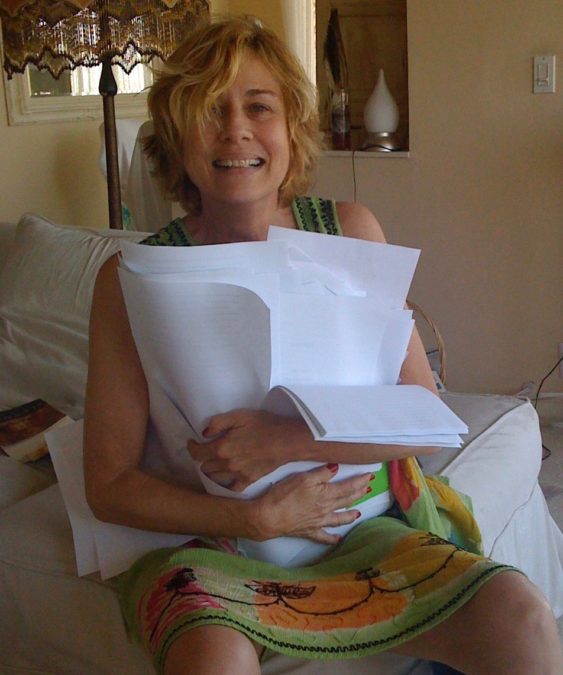WHY DO I WRITE?
I was five years old, sitting cross-legged on the beige and green
shag carpeting in our living room, scribbling in my Cinderella coloring book. It was a stormy day in January and the cast iron radiators were spitting and hissing. Icicles jutted down from the eaves of the roof, solidified in midair. A hush had fallen over the city and all I could hear was the mechanical roar of a snowplow.
I looked around at my family. My parents were sitting in matching
upholstered chairs, reading the newspaper, hypnotically handing sections to each other and dropping them into a pile on the floor. My older sister was sitting in a tan easy chair, writing a book report on Treasure Island. I felt like the odd girl out as I scanned the crowded bookshelves that climbed from floor to ceiling. I wanted to read and write like my big sister did. I was hungry for the adventures that were hidden in those pages, just waiting for me to discover.
When I learned to read in the first grade, my mother and I visited
our local library every day and I devoured the entire children’s section. Since then, books have offered me solace, richness, surprises and magic. I can’t imagine my childhood without Alice in Wonderland, Charlotte’s Web, and The Secret Garden. Who would I be without Scarlett O’Hara from Gone With the Wind? What if I hadn’t met Meg, Jo, Beth, and Amy from Little Women or Hester Prynne from The Scarlet Letter? These books taught me about love, connection, isolation, morality, good and evil, what it means to be a friend, and the consequences of lying.
When I started to write, I wasn’t any good at it. In fact I sucked but I never stopped to think about that. I didn’t show my writing to anyone so I didn’t get any feedback. I didn’t build up expectations or suffer trauma and criticisms. No one encouraged me but no one discouraged me either. When I got home from school, I’d sit on the little red cane chair in my bedroom, notebook in my lap, and I’d write because I wanted to. I did it every day, not because I thought I should. Not because I wanted to build stamina or get approval. I
didn’t consider becoming a writer when I grew up. I just wrote and I liked it so I kept on doing it. I see now that keeping my writing to myself was a good idea. I didn’t get steered in any particular direction. I just left myself alone and watched the words appear on the page.
One day, it was 1971, I sat down and to write and what came out
amazed me. It didn’t suck. At least I didn’t think so. I’d been bored that day and I‘d scribbled words that tuned into the following poem:
Little Miss Mottleby sits by the shelf,
She picks up a mirror and stares at herself.
She sees two glass eyes and some long flowing hair
A very large mouth and some white hands, a pair.
She wonders whatever she’s sitting there for.
She’d leave but in her house there isn’t a door.
She’d eat but there seems not to be any food.
She’d cry but decides that she’s not in the mood.
Perhaps one day soon, she’ll just stand up and shout
About animals, feelings and good sauerkraut.
For now, it suffices to just sit and brood
About having glass eyes, about having no food.
Decades later, when I began to teach, I wondered, What are a
writer’s recurring blocks? How can we learn to tap into a friendly wave length that can transform their inner critic from a demanding ogre into an encouraging fairy godmother? How can I show my students a way to play on the page like I did with my poem, Little Miss Mottleby? How could I help them go deeper once they finished their first draft? How can I help them get into the writing zone?
When you make it there, you know it. You’re in your own private
world where you make up the rules, you define the boundaries, you stay there as long as you like and you leave whenever you want. You are judge and jury. You decide who is welcome and who is not, who is guilty and who is innocent. No one gets to add or subtract anything without first getting permission from you.
How often does it occur that you’re the sole creator of your own
reality? Whether you feel ecstatic or intimidated, whether you’re drawing, painting singing, dancing or writing, remember that the reward is in the doing. There’s no telling if your creation will find a home other than your own, whether it’ll become a blockbuster bestseller or end up on the remainders table. Just do it for its own sake and see what happens. When you stop second guessing yourself and your abilities, when you forget about good or bad or
comparing yourself to anyone else, the world of creation can be a safe haven, a place to feel welcome, an outlet to express your emotions and an escape hatch when the world around you seems overwhelming.
These are the reasons that I write.


Recent Comments